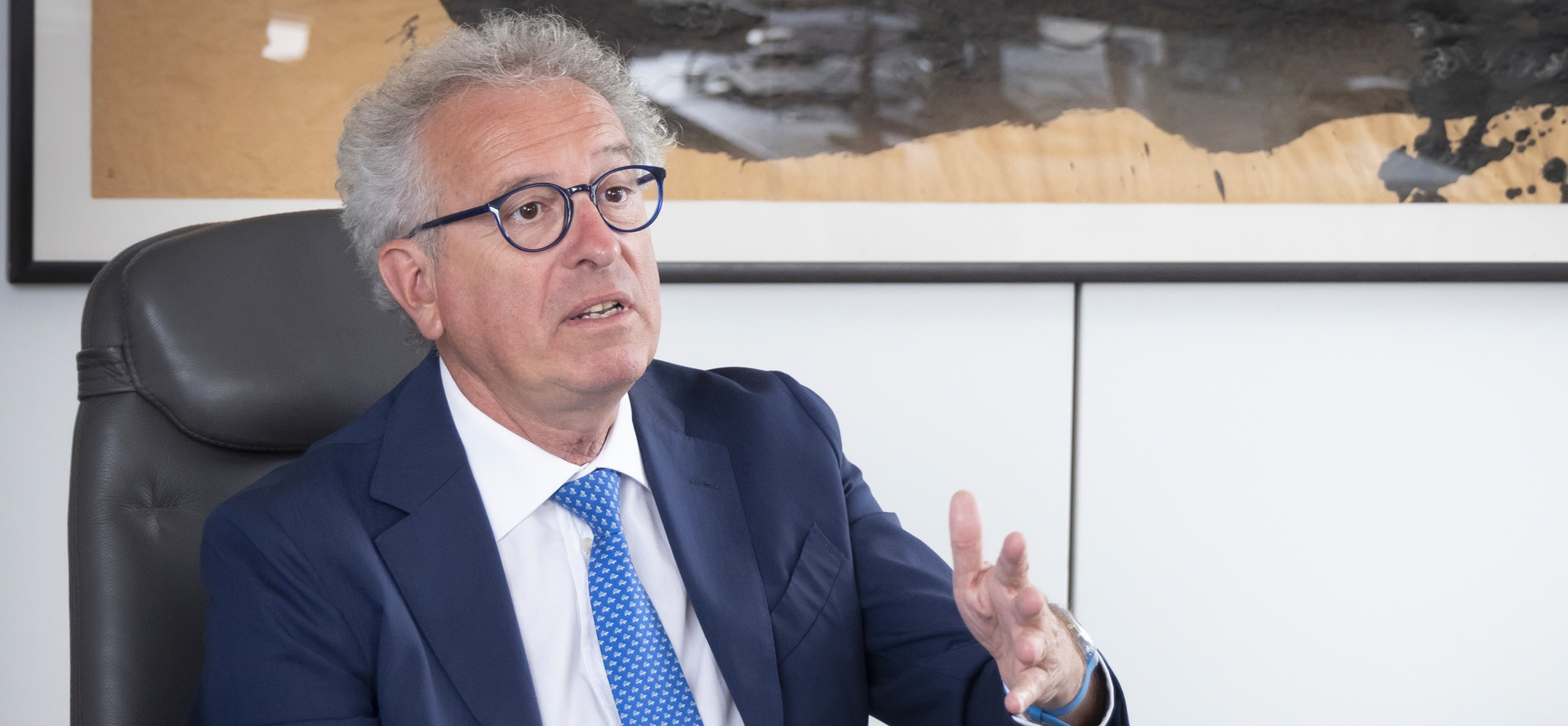Pierre Gramegna in interview with Xinhua, Caixin and South China Morning Post

Interview with ESM Managing Director Pierre Gramegna
Interview conducted on 25 March 2025
Interviewers: Zheng MA (Xinhua), Qing NA (Caixin) and Carol YANG (South China Morning Post)
Original language: English
What are the agenda and priorities for your trip this year?
The ESM has been doing roadshows in China on a regular basis. China has been a regular investor in the ESM from the beginning.
I, as the new Managing Director, came here in December 2023. This is my second visit to China in this capacity. I used to come to China on a regular basis as finance minister of Luxembourg, twice a year, normally.
The purpose is to meet private and public investors, and international financial institutions. We had a very interesting visit yesterday at the Asian Infrastructure Investment Bank (AIIB). And we have also met with public authorities.
On these occasions, we not only talk about finance, but also the broader view on the Chinese economy, on geopolitics, challenges to trade.
What specific areas do you foresee can be further enhanced in terms of cooperation between the ESM and China?
The ESM is the lender of last resort for the euro area. Like all European institutions, the ESM favours interaction with Chinese authorities, in the context of the International Monetary Fund [meetings], where we all meet.
The ESM also cooperates with peer institutions in Asia, like the Chiang Mai Initiative and AMRO, with whom we meet once a year in the margins of the IMF annual meetings. We have also once a year a seminar at experts’ level.
That exchange is very precious, especially at a time when multilateralism is being questioned by some.
With the People’s Bank of China, we have regular contacts every time we visit.
Finally, we have regular contacts with the AIIB, with which the ESM has signed a bilateral cooperation agreement in 2019, renewed in 2024. We work very closely together, exchanging experiences on the participation in markets, newest technologies, artificial intelligence.
The US has imposed tariffs not only on rivals but also on its allies and neighbours. Is the EU prepared to retaliate, and how far is it willing to go?
We are entering a time of turbulence in international trade as the US administration is applying tariffs to many countries in the world, including Europe.
The tariff that has been announced, 25% on imports of steel and aluminium, has quite an impact in terms of trade between Europe and the United States. The question is, how and when to retaliate. This is completely in the remit of the European Commission, discussing with the 27 EU Member States.
A general remark from our side is that increasing tariffs has negative consequences for global growth. The driving engine of growth in the past decades worldwide has been international trade. If we slow down international trade, because that's what tariff increases will achieve, we will reduce growth around the world.
Higher tariffs will increase prices, boost inflation, and reduce purchasing power of consumers. Together with the slowdown of the economy, that also entails the risk of increasing interest rates, all things that can lead to a slower economy worldwide and certainly has an impact on the bilateral relations between the US and Europe.
That being said, it is in the hands of the Commission to devise what is the best answer. Negotiation is probably the best when there is willingness on the other side to negotiate.
The Commission needs to look at the interests of the EU, make sure that a solution can be found that is balanced and that there is a symmetric relation between the United States and Europe.
With that protectionism background, how do China and Europe stand?
It goes without saying that it would be good that we do not have a worldwide trend of protectionism, because that would make things even worse for global growth.
China and Europe share a lot of values in the approach to trade. First, both China and Europe believe in multilateralism and refer to the World Trade Organisation (WTO) when there are problems. So, I think this bodes well for trying to find constructive solutions between China and Europe.
Roughly 21% of total imports into Europe come from China, our first supplier. For Europe, China is our third customer.
China has a huge trade surplus with Europe, about €300 billion for goods. Europe has a very small surplus in services. So, we are very meaningful for each other.
At the same time, by having or improving trade relations, we reinforce confidence between partners, we increase trust between partners.
How can China and Europe increase their financial cooperation to inject more stability?
Improve and boost bilateral trade. That's a measure that would be really confidence-building on both sides and would send a good example for other players in the world. Let's not forget that China and Europe are the two world champions of exports; exports of China and Europe account for an important part of our economies, much more than all other areas in the world.
Dialogue and rule of law is what should guide international relations.
How do you think trade tensions would affect the financial relations between the EU and China?
First, trade, as I have mentioned, is key for growth.
In terms of financial relations, I would take the example of the bonds issued by the ESM [and the EFSF], where Asia plays an important role.
In 2024, Asian investors represented 22% of total investors. That’s up from 9% in 2023, and the highest since the start of the ESM in 2011.
This cross-border investment from Asia, and particularly China, is a stabilising factor in international finance. Such financial stability is in the interest of all countries, but a particular advantage for China and Europe.
Why did China increase its participation in your bond issuances?
First, it helps China diversify its allocation of funds into euro-denominated bonds. Second, the confidence in the European economy is increasing. And third, interest rates have increased over the last couple of years and are more attractive than when interest rates were extremely low.
In your meeting with the People’s Bank of China, did you speak about cooperation in green bonds, one of the priorities for China's financial sector?
We did not. But, as you are aware, Europe is leading in the issuance of green bonds, and particularly the European Investment Bank. At a time when it is obvious that the interest for green bonds and ESG-denominated bonds has diminished in the United States, it is important that China and Europe continue to invest.
Climate change issues are there to stay. Climate change is one of the three major risks for our economies, alongside demographic challenges and geopolitical fragmentation.
In January, you mentioned the possibility of the ESM creating a credit line for defence and security spending. Do you think there will be consensus among members states for such a line?
Following the change in the US administration’s stance with the election of President Trump, Europeans have been very active in looking into all issues pertaining to defence.
Last week, the European Commission issued a White Paper on defence. The Commission also announced an €800 billion plan to finance defence. It is obvious that Europe needs to ramp up its defence efforts. In this context, the role of the ESM is mentioned.
It is just a proposal for the time being, and we are going to engage with the member states in the next weeks and months to prepare.
Author

Contacts


